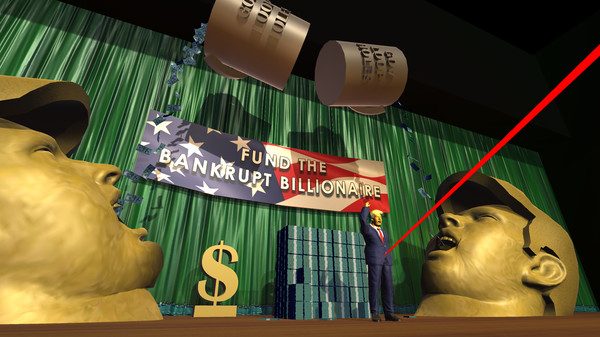Political satire and indie games
Art has a longstanding tradition of being created for a political satire. Whether that is 60’s music attacking the establishment to cartoons found in the back pages. Yet despite the growing acceptance that video games are an art form, there are very few games which tackle politics, let alone through satire. This is not down to lack of humour, as video games tend to ooze humour even when they aren’t attempting too, just take the arrow to the knee memes of Skyrim or the hilarious crushing of the free press by the great Commander Shepard from Mass Effect. The lack of political satire in video games until now stemmed from the trifecta of mechanical and technical limitations, the necessity of sales, and a limited demographic with high political apathy in which to sell to.
This, however, is starting to change. Let’s take the first issue of limitations. From a video game mechanics standpoint, people have to make games that are fun to play while also satirising politics. This is harder than you’d think considering many developers struggle even without having to include a narrative about politics. A recent game that has excelled at this is Mr. President; a ragdoll physics puzzle game in which you are the bodyguard of President Ronald Rump as you attempt to save his life from assassination. The game takes swings at Trump’s (ahem sorry Rump’s) stances on immigration as well as his connections to Russia and serves as a perfect example of how the industry is starting to mix political satire with great game mechanics.

Image: Game Developer X, IGDB
The increase in satire in video games can also be attributed to the renaissance of indie developers and the growth of Steam as a platform to spread these independent games far and wide. Before the advent of Steam, games had limited options in terms of creating video games, as they usually required larger-scale development teams to step up and finance the physical production of the game. Political satire in video games was divisive due to the offence it could create, and dividing up and limiting a consumer base was simply not profitable. This inherently drove away political satire from video games in all but the most basic of forms (such as can be found in the Tropico games making fun of Latin American dictators.) With the availability of game development tools such as Unity and platforms such as Steam, this has allowed the development of accessible satirical games such as the upcoming Maybot Run, which attacks the Conservative government while you play as robot Theresa May dodging obstacles and acquiring tax.
The renaissance of indie developers and the growth of Steam as a platform to spread these independent games far and wide
But satirical games like Maybot Run wouldn’t be successful if not for the rapid expansion of the gaming community in the last few years, mixed with the more commonplace theme of politics in video games. Decades ago gamers tended to be seen as a smaller subset of society and video games were the punching bags of blame for increasing violence and drug use. This pushed many gamers away from interacting with politics, leading to varying degrees of apathy. Now with political games such as Democracy 3, politics (and specifically political satire) are being seen as magnets to attract people to new games or back to old ones. Take Surgeon Simulator’s excellent Trump level in which you have to replace Trump’s organs with new ones covered in gold, a decade before this could have been a real problem and gotten them in trouble with the fan base. Thanks to the changing face of video games, political commentary is becoming more and more commonplace and accepted by the community.

Live results of heart transplants given to Trump in Surgeon Simulator. Image: Bossa Studios, SurgeonSim
This is not to say that this developing trend has been completely used for good. Take the recent flash game Hit the Corrupt Officials in China created by ‘The People’s Daily’ (the Communist Party’s propaganda mouthpiece). The game works like whack-a-mole where the player electrocutes corrupt city officials that pop out of windows with a taser. This game coincided with anti-corruption efforts in China that critics say is little more than the purging of political opposition by Xi Jinping. The misuse of video games as political propaganda tools comes with the territory of the development of video game satire yet this should not deter us as the benefits greatly outweigh the downsides to this sort of advancement and other methodologies such as newspapers which suffer from similar weaknesses have not been stopped.
Overall, however, I am optimistic for the future of political satire through the medium of video games as right now we need to bring satire into the modern day to deal with modern politics.

Comments